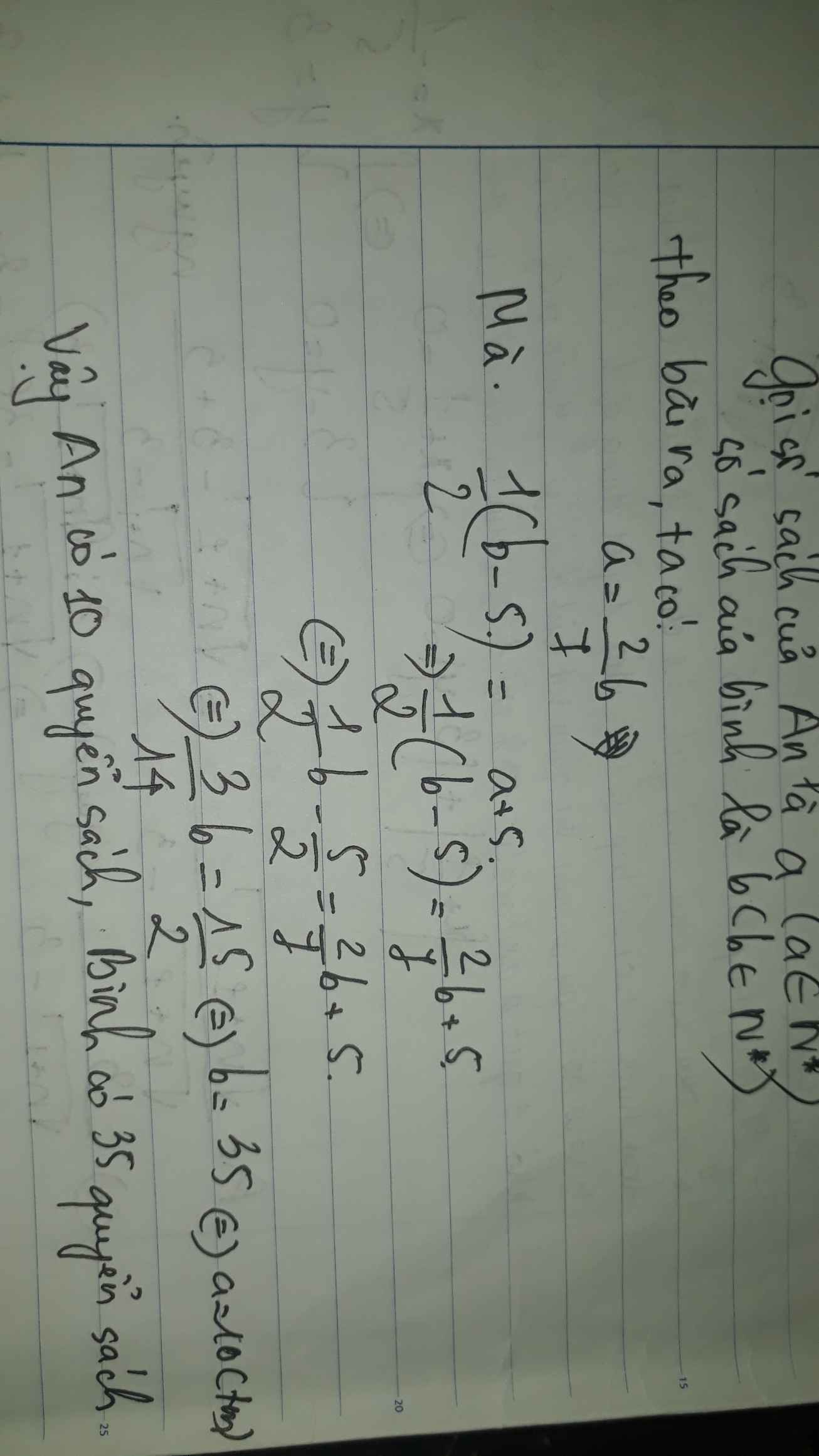giải phương trình ; \(\dfrac{x-130}{20}\)+\(\dfrac{x-100}{25}\)+\(\dfrac{x-60}{30}\)+\(\dfrac{x-10}{35}\)=10
Hãy nhập câu hỏi của bạn vào đây, nếu là tài khoản VIP, bạn sẽ được ưu tiên trả lời.


\(\Leftrightarrow\dfrac{2\left(x-2\right)\left(x+2\right)-x\left(2x+3\right)}{2x\left(x-2\right)}=0\)
\(\Leftrightarrow\dfrac{2\left(x^2-4\right)-2x^2-3x}{2x\left(x-2\right)}=0\)
\(\Leftrightarrow2x^2-8-2x^2-3x=0\)
\(\Leftrightarrow-3x=8\)
\(\Leftrightarrow x=-\dfrac{8}{3}\)
\(\dfrac{x+2}{x}-\dfrac{2x+3}{2\left(x-2\right)}=0\left(ĐKXĐ:x\ne0;x\ne2\right)\)
\(\Leftrightarrow\dfrac{2\left(x-2\right)\left(x+2\right)}{2x\left(x-2\right)}-\dfrac{x\left(2x+3\right)}{2x\left(x-2\right)}=0\)
\(\Rightarrow2\left(x^2-4\right)-2x^2-3x=0\)
\(\Leftrightarrow2x^2-8-2x^2-3x=0\)
\(\Leftrightarrow-3x-8=0\)
\(\Leftrightarrow x=\dfrac{-8}{3}\) (nhận).
-Vậy \(S=\left\{\dfrac{-8}{3}\right\}\)

đk : x khác -1 ; 3
\(\Rightarrow4x-x\left(x+1\right)=x\left(x-3\right)\Leftrightarrow4x-x^2-x=x^2-3x\)
\(\Leftrightarrow2x^2-6x=0\Leftrightarrow2x\left(x-3\right)=0\Leftrightarrow x=0\left(tm\right);x=3\left(ktm\right)\)
\(ĐK:x\ne-1;x\ne3\)
\(\Leftrightarrow\dfrac{2x}{\left(x+1\right)\left(x-3\right)}=\dfrac{x}{2\left(x+1\right)}+\dfrac{x}{2\left(x-3\right)}\)
\(\Leftrightarrow\dfrac{4x}{2\left(x+1\right)\left(x-3\right)}=\dfrac{x\left(x-3\right)+x\left(x+1\right)}{2\left(x+1\right)\left(x-3\right)}\)
\(\Rightarrow4x=x^2-3x+x^2+x\)
\(\Leftrightarrow2x^2-6x=0\)
\(\Leftrightarrow2x\left(x-3\right)=0\)
\(\Leftrightarrow\left[{}\begin{matrix}x=0\left(n\right)\\x=3\left(l\right)\end{matrix}\right.\)

\(\left[{}\begin{matrix}x=2\\x=\dfrac{-1}{3}\end{matrix}\right.\)

Ta có: \(8-y^2=\left|xy-4\right|\ge0\Rightarrow y^2\le8\) (1)
Xét phương trình: \(x^2+2=xy\Leftrightarrow x^2-xy+2=0\)
\(\Leftrightarrow x^2-xy+\dfrac{y^2}{4}-\dfrac{y^2}{4}+2=0\)
\(\Leftrightarrow\dfrac{y^2}{4}-2=\left(x-\dfrac{y}{2}\right)^2\ge0\Rightarrow y^2\ge8\) (2)
Từ (1); (2) \(\Rightarrow\left\{{}\begin{matrix}y^2\ge8\\y^2\le8\end{matrix}\right.\) \(\Rightarrow y^2=8\Rightarrow y=...\)
Thế vào giải ra x


\(\hept{\begin{cases}\sqrt{x-1}-\frac{1}{2y-1}=0\\2\sqrt{x-1}+\frac{1}{2y-1}=3\end{cases}}\Leftrightarrow\hept{\begin{cases}2\sqrt{x-1}-\frac{2}{2y-1}=0\\2\sqrt{x-1}+\frac{1}{2y-1}=3\end{cases}}\)
Lấy (1) - (2) ta được : \(-\frac{2}{2y-1}-\frac{1}{2y-1}=-3\Leftrightarrow\frac{-3}{2y-1}=-3\)
\(\Rightarrow-6y+3=-3\Leftrightarrow y=1\)
Thay vào (2) ra được : \(2\sqrt{x-1}=2\Leftrightarrow x=1\)( tmđk \(x\ge1\))
Vậy hệ phương trình có một nghiệm ( x ; y ) = ( 1 ; 1 )
Đặt \(\sqrt{x-1}\)=A; \(\dfrac{1}{2y-1}\)=B(A>0;B khác 0) ta được:
A-B=0 ⇔ B=1
2A+B=3 A=B=1(cả 2 thỏa mãn)
Trở lại phép đặt: \(\sqrt{x-1}\)=1 ⇔ x=2
\(\dfrac{1}{2y-1}\)=1 y=1

Số sách của Bình là:
\(15:\dfrac{3}{7}=15\cdot\dfrac{7}{3}=35\)(quyển)
Số sách của An là:
\(35\cdot\dfrac{2}{7}=10\)(quyển)

A = \(\frac{-7}{10^{2005}}\)+ \(\frac{-8}{10^{2006}}\)+ \(\frac{-7}{10^{2006}}\)
B = \(\frac{-7}{10^{2005}}\)+ \(\frac{-8}{10^{2005}}\)+ \(\frac{-7}{10^{2006}}\)
Vì \(\frac{-7}{10^{2005}}\)= \(\frac{-7}{10^{2005}}\); \(\frac{-7}{10^{2006}}\)= \(\frac{-7}{10^{2006}}\); \(\frac{-8}{10^{2006}}\)> \(\frac{-8}{10^{2005}}\) ( vì tử chung là số âm nên mẫu lớn hơn thì phân số đó lớn hơn)
=> \(\frac{-7}{10^{2005}}\)+ \(\frac{-7}{10^{2006}}\)+ \(\frac{-8}{10^{2006}}\)> \(\frac{-7}{10^{2005}}\)+ \(\frac{-7}{10^{2006}}\)+ \(\frac{-8}{10^{2005}}\)
=> A > B

\(\dfrac{x-130}{20}\)+\(\dfrac{x-100}{25}\)+\(\dfrac{x-60}{30}\)+\(\dfrac{x-10}{35}\)=10
⇔\(\dfrac{2625\left(x-130\right)}{52500}\)+\(\dfrac{2100\left(x-100\right)}{52500}\)+\(\dfrac{1750\left(x-60\right)}{52500}\)+\(\dfrac{1500\left(x-10\right)}{52500}\)=\(\dfrac{525000}{52500}\)
⇔2625\(x\)-341250+2100\(x\)-210000+1750\(x\)-105000+1500\(x\)-15000=525000
⇔ 7975\(x\) = 1196250
⇔ \(x\) = \(\dfrac{1196250}{7975}\)
⇔\(x \) = 150